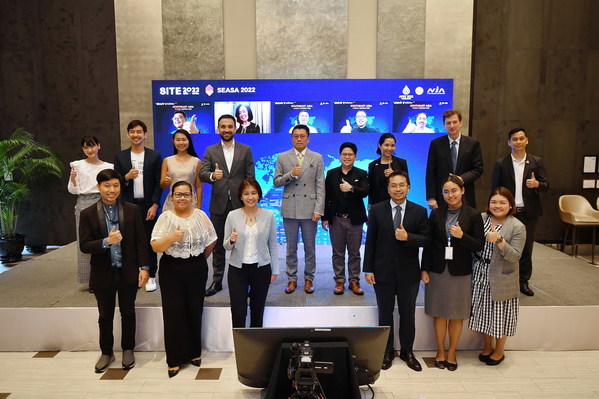Southeast Asia Startup Assembly 2022: Bridging collaborations among ASEAN plus government startup agencies
NIA has recently hosted the Southeast Asia Startup Assembly (SEASA 2022) where representatives from 6 ASEAN countries and its partnering countries exchanged knowledge to forge regional startup collaborations.
The Roles of Governments in Promoting Startups in the post-COVID-19 era was among highlighted topics.
BANGKOK,July 25,2022 -- Thailand's National Innovation Agency (Public Organization) or NIA has recently hosted the Southeast Asia Startup Assembly (SEASA 2022) in Bangkok under the theme "Open the Cities for Startup Opportunities among APEC Member Economies". The hybrid event brought together representatives from government startup agencies from ASEAN and partnering countries - Thailand,Brunei,Malaysia,Vietnam,China,and India to discuss the main issues confronting the startup ecosystem and the solutions that can be achieved through a united effort.

Southeast Asia Startup Assembly 2022 (SEASA 2022): Bridging collaborations among ASEAN plus government startup agencies
Dr. Pun-Arj Chairatana,Executive Director of NIA,said the COVID-19 pandemic has brought changes in people's life,as well as work and business operations. Notably,innovativeness,foresight,and resilience are some of the key factors helping firms to overcome global challengesand thrive during the post-COVID 19 era. The government has a significant role to supportin promoting invaluable assets such as Artificial Intelligence,digital transformation,technology,advanced materials,and manufacturing. "We should leverage on each other'sexperience and expertise to enhance the strength of the overall ecosystem. SEASA event is therefore the place where key players in regional startup communities can exchange knowledge and experience regarding policies,current situations,and challenges that all are currently facing." Dr.Pun-Arj also expressed his confidence that with continued cooperation and goodwill within the region,the startup communities will together navigate through this dire time to a brighter future.
The representatives of each country made their brief presentations on "The Roles of Governments in Promoting Startups in the Post-COVID-19 Era" focusing on policy,launch pads,and the current startup situation to maintain strong collaborations of the ASEAN startup ecosystem. It reflected that they have similar policies to support startups.
Since the COVID-19 pandemic had accelerated the digital transformation and forced people to adapttheir behaviors into accepting a cashless society,now 90% of Brunei population is now completely comfortable with the QR codes. This opens us up to the acceptance of things like e-wallets and cashless transactions. To support tech innovation and capacity building,they are going to launch a Brunei Innovation scheme in July 2022. India has India Stack model to support a market expansion through eKYC and customer onboarding. This enables its population to better access financial services. The government also developed and launched UPI to ensure that everybody has an opportunity to access the digital payment. While Thailand has been trying to provide easy access and create infrastructure and opportunities for both Thai and international tech enterprises under the Thailand 4.0 initiatives. And Malaysiangovernment has been working on three pillars to promote the digital economy - digital talents,digital businesses,and digital investment.
Community and Ecosystem is also important.Hence,the Thai government started the Global Startup Hub in Thailand five years ago. They have currently set up offices in Bangkok,Chiang Mai,and Eastern Economic Corridor (EEC) to facilitate local and foreign startups in various sectors. Malaysiaalso has been trying to build startup communities and facilitate the market. The government has launched Malaysia Digital Hub Initiatives with over 400 startups in communities. To foster its startup ecosystem,Vietnamese government is working aggressively on next steps by developing the policy sandbox to fund startups directly,producing more talents,setting up innovation corridor and strengthening both domestic and international networks. Recently,they also amended the Intellectual Property (IP) laws,aiming to encourage universities and startups to bring more technology and research into commercialization.
In terms of foreign investment,the pandemic disconnected most flights causing more difficulties to attract foreign startups to expand or establish in other countries. Therefore,China has set up Chinese Academy of Sciences (CAS) centers in overseas including in Bangkok. Besides,it also cooperates with Chulalongkorn University to set up an incubation center and creates partnerships with the government agencies and local investors to attract Chinese startups to Thailand by focusing on the sectors related to bioeconomy,circular economy,and green economy.The Malaysian government also welcomes foreign startups to invest in Malaysia by offering 1-5 year passes for entrepreneurs who would like to explore or want to set up a business in Malaysia
Panelists also discussed Environmental,Social,and Governance or ESG which is a huge trend influencing all sectors including startups. For some startups receiving funding from big corporates,they are already required to meet ESG compliances. In addition,businesses and universities should escalate their collaborative efforts to make the research or studies more practical for businesses. In conclusion,the post-COVID-19 time requires resilience and agility where startups need to create business models that suit the current situation. Therefore,the governments need to have policies in place to create business continuity for SMEs and startups as well as help ease some unnecessary regulations to improve a long-term business environment.
Apart from 6 countries joining the SEASA event,Thailand also has a strong connection with other ASEAN and partner countries namely Singapore,Korea,and Japan. And they will foster collaborations to together drive innovation in the future.